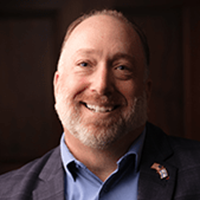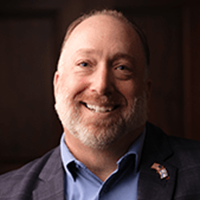4 Keys to Smart Financial Planning
Information overload can trip up good decision making. To protect your retirement security, you’ve got to stay focused.


Profit and prosper with the best of Kiplinger's advice on investing, taxes, retirement, personal finance and much more. Delivered daily. Enter your email in the box and click Sign Me Up.
You are now subscribed
Your newsletter sign-up was successful
Want to add more newsletters?
The world of finance always has been a busy, noisy place — and right now it’s bordering on cacophony.
Besides all the usual financial decisions that need to be made (Buy! Sell! Save! Stocks! Bonds! Annuities!), every event — real or predicted — seems to turn up the volume … and the worry.
For people who are close to retirement, all this chatter is particularly scary, as they try to protect every dollar they’ve put away. For some, it’s paralyzing; they can’t make a move because it might be a misstep. Others seem to shift with the wind — or, at least, the latest sound bite. The more information they receive, the more they wonder how each bit of news will affect their portfolio.
From just $107.88 $24.99 for Kiplinger Personal Finance
Become a smarter, better informed investor. Subscribe from just $107.88 $24.99, plus get up to 4 Special Issues

Sign up for Kiplinger’s Free Newsletters
Profit and prosper with the best of expert advice on investing, taxes, retirement, personal finance and more - straight to your e-mail.
Profit and prosper with the best of expert advice - straight to your e-mail.
I get it. I do. But there is a way to take the noise down a notch, and perhaps even the fear.
Plan with a purpose. If you’re trying to get to retirement, or you’re already there and you don’t want to fail, you have to set up your portfolio in a way that makes sense for you. Not your friends or co-workers. Not the guy at your golf club. Not the woman who called into The Suze Orman Show and loved her response. Just you.
Now, I’m not saying that you shouldn’t listen to the people out there giving investing advice. What I’m suggesting is that you do it with a filter, taking into account your retirement horizon, your needs and your family’s needs, your morals and your ethics.
Focus on what you can control. Stock prices and interest rates tend to affect the choices investors make, even though they have no control over them. But what you can manage is your personal risk. Once you’ve moved from the accumulation phase to the preservation/distribution phase of life, your mindset should shift from the return on your money to the return of your money.
It’s like owning real estate and having a renter who pays you on time every month. The value of your property may go up or down, but you’re not going to sell it if you don’t have to — you’re sticking with that consistent rent check.
For most, what the value of an individual stock is on any given day isn’t that important — it’s consistency that counts. With investing, your portfolio should be designed to generate income in your retirement.
Look to the long term. There will always be events that pop up to rattle investors and affect the market, good or bad. With a new president, there could be changes in policy regarding interest rates, the Department of Labor’s fiduciary rule and estate tax laws — just to name a few. Instead of investing in reaction to these events, stick to what feels right.
For example, if during estate planning you bought a big life insurance policy to cover taxes, and the new administration ends up getting rid of the estate tax, was the life insurance unnecessary? Maybe not. It’s still going to provide money to your heirs to cover a lot of expenses.
The same holds true for the market. Let’s say you set up your portfolio to be less susceptible to volatility while your buddy hangs onto a plan that has far more risk. If the market has a good quarter and he brags about his return, it will be tough not to wonder if you should have followed his lead. Don’t. He might not be in the same place in his life. He might have other sources of income to depend on if the market experiences a downturn. (And when the market does take a downturn, you probably won’t hear about his losses.)
Choose an adviser who fits your investing style. If you like to travel at 35 mph, you probably won’t be happy with a driver who goes 55 or faster. The same holds true for your finances. It’s about an investment philosophy and a mutual understanding of what you’re trying to accomplish.
My clients want me to have my finger on the market’s pulse, to make adjustments when necessary — always keeping their risk tolerance in mind — and to keep them informed. That’s the idea of working with a fiduciary.
If your adviser says “it’s only a paper loss” or “it will come back,” you may not be investing with a low-volatility approach. Don’t be afraid to look elsewhere or, at least, to get a second opinion.
Alan Becker is founder, president and chief executive officer of Retirement Solutions Group. He is also the host of the “Retire Right with Alan Becker” radio show. A U.S. Navy veteran, Becker has been in the insurance industry for 18 years.
Kim Franke-Folstad contributed to this article.
Retirement Solutions Group and RSG Investments are independent financial services firms that, in concert, create retirement strategies using a variety of investment and insurance products. Neither the firm nor its representatives may give tax or legal advice. Investment advisory services offered through AE Wealth Management, LLC. Investing involves risk, including the loss of principal. No investment strategy can guarantee a profit or protect against loss in periods of declining values. Any references to protection benefits or lifetime income generally refer to fixed insurance products, never securities or investment products. Insurance and annuity product guarantees are backed by the financial strength and claims-paying ability of the issuing insurance company.
Profit and prosper with the best of Kiplinger's advice on investing, taxes, retirement, personal finance and much more. Delivered daily. Enter your email in the box and click Sign Me Up.

Alan E. Becker is the President and CEO of RSG Investments, LLC, with multiple locations in the Kansas City, Missouri, metro area. After his service in the Navy, Alan entered the financial industry in 1998. He began as an insurance agent holding licenses in Kansas, Texas and Missouri before passing his Series 65 securities exam to become an Investment Adviser Representative. He has since built RSG Investments from the ground up to serve as an independent source of comprehensive financial advice capable of helping individuals "to and through" their unique retirement journey.
-
 8 Boring Habits That Will Make You Rich in Retirement
8 Boring Habits That Will Make You Rich in RetirementThese mundane activities won't make you the life of the party, but they will set you up for a rich retirement. Discover the 8 boring habits that build real wealth.
-
 QUIZ: Are You Ready To Retire At 55?
QUIZ: Are You Ready To Retire At 55?Quiz Are you in a good position to retire at 55? Find out with this quick quiz.
-
 10 Decluttering Books That Can Help You Downsize Without Regret
10 Decluttering Books That Can Help You Downsize Without RegretFrom managing a lifetime of belongings to navigating family dynamics, these expert-backed books offer practical guidance for anyone preparing to downsize.
-
 Will Your Children's Inheritance Set Them Free or Tie Them Up?
Will Your Children's Inheritance Set Them Free or Tie Them Up?An inheritance can mean extraordinary freedom for your loved ones, but could also cause more harm than good. How can you ensure your family gets it right?
-
 I'm a Financial Adviser: This Is the Real Key to Enjoying Retirement With Confidence
I'm a Financial Adviser: This Is the Real Key to Enjoying Retirement With ConfidenceA resilient retirement plan is a flexible framework that addresses income, health care, taxes and investments. And that means you should review it regularly.
-
 Life Loves to Throw Curveballs, So Ditch the Rigid Money Rules and Do This Instead
Life Loves to Throw Curveballs, So Ditch the Rigid Money Rules and Do This InsteadSome rules are too rigid for real life. A values-based philosophy is a more flexible approach that helps you retain confidence — whatever life throws at you.
-
 Buy and Hold … or Buy and Hope? It's Time for a Better Retirement Planning Strategy
Buy and Hold … or Buy and Hope? It's Time for a Better Retirement Planning StrategyOnce you're retired, your focus should shift from maximum growth to strategic preservation and purposeful planning to help safeguard your wealth.
-
 Your Legacy Is More Than Your Money: How to Plan for Values, Not Just Valuables
Your Legacy Is More Than Your Money: How to Plan for Values, Not Just ValuablesLegacy planning integrates your values and stories with legal and tax strategies to ensure your influence benefits loved ones and good causes after you're gone.
-
 Will Real Estate and Private Equity Start to Shine Again in 2026?
Will Real Estate and Private Equity Start to Shine Again in 2026?Real estate, private equity and general partner stakes could benefit from future interest rate cuts. What are the risks and rewards of investing in each?
-
 Your Retirement Age Is Just a Number: Today's Retirement Goal Is 'Work Optional'
Your Retirement Age Is Just a Number: Today's Retirement Goal Is 'Work Optional'Becoming "work optional" is about control — of your time, your choices and your future. This seven-step guide from a financial planner can help you get there.
-
 Have You Fallen Into the High-Earning Trap? This Is How to Escape
Have You Fallen Into the High-Earning Trap? This Is How to EscapeHigh income is a gift, but it can pull you into higher spending, undisciplined investing and overreliance on future earnings. These actionable steps will help you escape the trap.